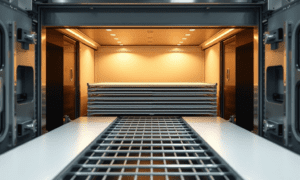Manufacturing has witnessed dramatic transformation in recent years, as businesses look for cost savings and efficiency with electric equipment. One key driver behind these changes has been electric machinery’s increased use; such as replacing traditional fuel-based systems with efficient electricity-powered ones that provide constant power. Businesses today must find ways to meet stricter environmental regulations without increasing operational expenses while meeting stringent compliance rules. Reliable storage solutions like Deka industrial batteries provide consistent power sources that enable seamless operations in manufacturing businesses.
The Rise of Electric Machinery in Manufacturing
Electric machinery has rapidly emerged as an indispensable resource in manufacturing due to its ability to meet modern industry’s unique demands. Electric machines offer significant energy efficiency compared to their fuel-powered counterparts, helping businesses cut energy consumption and costs as well as produce less emissions; their quieter operational profile also adds appeal for environments in which noise reduction is an objective, creating safer workplace environments and making workdays more comfortable overall.
At the core of this shift is advancements in battery technology. Modern batteries provide reliable power sources, enabling electric machinery to perform seamlessly even during long production hours – helping manufacturers minimize operational downtime which is usually costly for manufacturers. By adopting cutting-edge battery solutions manufacturers can maintain high productivity levels while benefitting from durable yet energy-efficient electric equipment solutions.
Benefits of Electric Equipment in Cost Savings
By switching to electric machinery, your business could experience significant cost-cutting benefits over time. Here’s how:
Lower Operational Costs
Electric equipment offers many operational cost advantages over its more conventional counterparts, including eliminating fuel expenses and reduced maintenance needs due to fewer moving parts than traditional machines, as well as fewer repairs needed overall. This could significantly decrease operational expenses.
Improved Energy Efficiency
Electric tools have become more energy-efficient over the past years. Not only does this decrease electricity bills but it can also minimize waste resources. When combined with advanced energy storage solutions like Deka industrial batteries, you can maximize utilization while keeping operations running smoothly.
Enhanced Productivity
Electric machinery often features designed to enhance precision and reliability, lowering the risk of breakdowns. As a result, this can result in higher output levels and overall improved manufacturing processes.
Challenges of Transitioning to Electric Equipment
Transitioning to electric equipment comes with its share of challenges, one being its upfront investment. Acquiring new machinery or upgrading infrastructure may seem costly at first, leading many businesses to reconsider switching – however businesses must view this expenditure as long-term strategic investments; eventually, savings in terms of energy consumption reduction, maintenance expenses reduction, and efficiency gains far outstrip their initial outlays, making switching a wise move for any forward-thinking organization.
Energy storage solutions must also meet the stringent demands of electric machinery. High-grade batteries are key in keeping equipment operating at optimal performance without costly disruptions; investing in reliable tools like Deka industrial batteries could make an enormous difference in maintaining consistent performance over time. By planning their transition carefully and investing in reliable equipment, businesses can navigate this hurdle and realize all of the advantages offered by electricity-powered solutions.
The Future of Manufacturing with Electric Equipment
Manufacturing’s future looks bright, with exciting advances coming for electric machinery. Smart technology is becoming more integrated into these tools to enable remote monitoring, predictive maintenance, and data analysis capabilities; all designed to increase efficiency while helping identify any issues before they turn into costly problems.
Continued advances in battery technology should lead to longer-lasting and faster charging solutions, further expanding its appeal as an option for manufacturers. These innovations may make electric equipment even more cost-effective for production environments.
Adopting electric-powered equipment will enable your business to remain competitive in a fast-changing industry. It will offer cost savings, increased efficiencies, and a contribution to creating a greener tomorrow—an aim shared by consumers and regulators alike.
Conclusion
As manufacturing continues to evolve, electric machines offer businesses an opportunity to reduce costs, boost efficiency, and meet environmental sustainability goals. Though initial investments and infrastructure upgrades may cause initial challenges in this transition, their long-term benefits cannot be ignored. Dependable energy storage solutions like Deka industrial batteries are key for maintaining smooth operations while unlocking the maximum potential from electric tools.



































